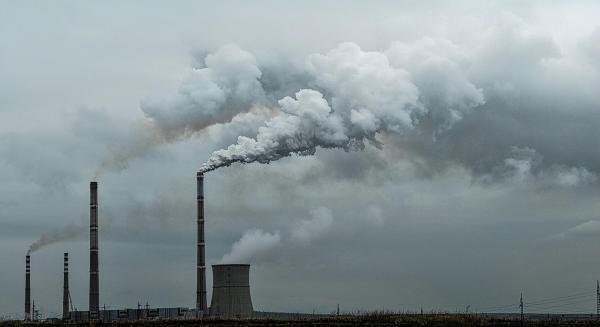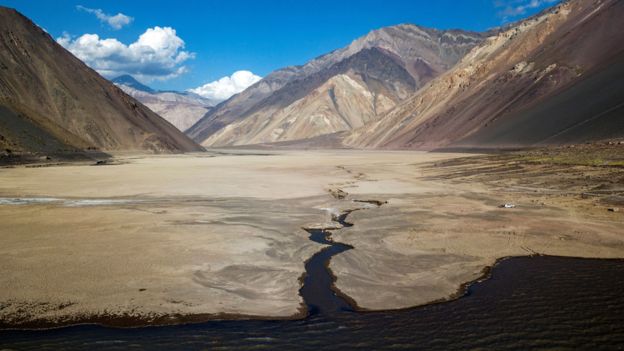Rhiannon12866
Rhiannon12866's JournalSNL At-Home: Dr. Anthony Fauci Cold Open
Dr. Anthony Fauci (Brad Pitt) addresses the public to decipher the coronavirus misinformation President Trump has been spreading.
Coronavirus has created conditions for unique environmental science 'global experiment'
Stay-at-home orders enacted to slow human movement, and consequently the spread of COVID-19, have had obvious benefits for the environment, but they are also impacting environmental science. Researchers are racing to collect atmospheric and other data, which they can use to assess their climate models and determine the extent of the impact of the coronavirus on the environment and human health as it relates to pollution and air quality.
"There's a global experiment going on in our atmosphere," said Joellen Russell, professor in the University of Arizona Department of Geosciences.
But before researchers can determine with confidence how and why greenhouse gas emissions are changing due to the social and economic impacts of COVID-19, they probably need several months of monitoring, said Riley Duren, research scientist in the Office for Research, Innovation and Impact. That's because multiple measurement types and sophisticated computer models are required to disentangle the effects of a highly variable atmosphere and the complex interactions between human and natural processes that govern emission and removal of atmospheric gases.
"In the United States, most atmospheric measurements come from the National Oceanic and Atmospheric Administration," said Russell, who also is chair of the Climate Working Group for NOAA's Science Advisory Board. The board recently requested that NOAA aggregate greenhouse gas measurements with other entities and also collaborate with health agencies to assess whether there are consequences on human health.
Duren is co-founder of the interagency Megacities Carbon Project in Los Angeles—part of a global network of urban pilot projects that tracks greenhouse gas emissions across geographic scales and economic sectors to support efforts to mitigate climate change.
All greenhouse gas emissions—which are a combination of human and natural activity—are quickly mixed in the atmosphere after they're released, Duren said. Carbon dioxide and methane, two of the most potent gases that contribute to global warming, are not very reactive and linger in the atmosphere, making it challenging to disentangle the new gases from what has been there for decades.
"Imagine a street where multiple homes have sprinkler system leaks and you're measuring water in a downstream storm channel, trying to determine who has the biggest leak. It's going to be hard unless you have a way to trace the source," Duren said. "The scientific opportunity here is that there are currently some large and well-known changes in human activity. That offers a known input to better disentangle what's contributing to gases in the atmosphere."
Read more: https://phys.org/news/2020-04-coronavirus-conditions-unique-environmental-science.html

Credit: CC0 Public Domain
Coronavirus has created conditions for unique environmental science 'global experiment'
Stay-at-home orders enacted to slow human movement, and consequently the spread of COVID-19, have had obvious benefits for the environment, but they are also impacting environmental science. Researchers are racing to collect atmospheric and other data, which they can use to assess their climate models and determine the extent of the impact of the coronavirus on the environment and human health as it relates to pollution and air quality.
"There's a global experiment going on in our atmosphere," said Joellen Russell, professor in the University of Arizona Department of Geosciences.
But before researchers can determine with confidence how and why greenhouse gas emissions are changing due to the social and economic impacts of COVID-19, they probably need several months of monitoring, said Riley Duren, research scientist in the Office for Research, Innovation and Impact. That's because multiple measurement types and sophisticated computer models are required to disentangle the effects of a highly variable atmosphere and the complex interactions between human and natural processes that govern emission and removal of atmospheric gases.
"In the United States, most atmospheric measurements come from the National Oceanic and Atmospheric Administration," said Russell, who also is chair of the Climate Working Group for NOAA's Science Advisory Board. The board recently requested that NOAA aggregate greenhouse gas measurements with other entities and also collaborate with health agencies to assess whether there are consequences on human health.
Duren is co-founder of the interagency Megacities Carbon Project in Los Angeles—part of a global network of urban pilot projects that tracks greenhouse gas emissions across geographic scales and economic sectors to support efforts to mitigate climate change.
All greenhouse gas emissions—which are a combination of human and natural activity—are quickly mixed in the atmosphere after they're released, Duren said. Carbon dioxide and methane, two of the most potent gases that contribute to global warming, are not very reactive and linger in the atmosphere, making it challenging to disentangle the new gases from what has been there for decades.
"Imagine a street where multiple homes have sprinkler system leaks and you're measuring water in a downstream storm channel, trying to determine who has the biggest leak. It's going to be hard unless you have a way to trace the source," Duren said. "The scientific opportunity here is that there are currently some large and well-known changes in human activity. That offers a known input to better disentangle what's contributing to gases in the atmosphere."
Read more: https://phys.org/news/2020-04-coronavirus-conditions-unique-environmental-science.html

Credit: CC0 Public Domain
Climate change: World mustn't forget 'deeper emergency'
Despite the impacts of the coronavirus pandemic, the world mustn't forget the "deeper environmental emergency" facing the planet.That's the view of the UN Secretary General Antonio Guterres, in remarks released to celebrate Earth Day.
The toll taken by the virus is both "immediate and dreadful", Mr Guterres says.
But the crisis is also a wake-up call, "to do things right for the future," said the Secretary General.
Mr Guterres re-iterated his view that the coronavirus is the biggest challenge the world has faced since the Second World War.
But as the world commemorates the 50th anniversary of Earth Day, the planet's "unfolding environmental crisis" is an "even deeper emergency", he says.
"Biodiversity is in steep decline," Mr Guterres stated.
"Climate disruption is approaching a point of no return.
"We must act decisively to protect our planet from both the coronavirus and the existential threat of climate disruption."
A long-term advocate of strong action to tackle global heating, Mr Guterres is now proposing six climate-related actions that should shape the recovery after the virus.
The world has to deliver new jobs and businesses through a "clean, green transition".
Taxpayers' money, when it is used, "needs to be tied to achieving green jobs and sustainable growth".
Money must be used to make people and societies more resilient to climate change, he says.
"Public funds should be used to invest in the future not the past."
Fossil fuel subsidies from governments is a theme that Mr Guterres has highlighted many times. These must end he says, and polluters must pay for their pollution.
The world will need to work together, says the Secretary General, and climate risks will need to be factored into the financial system and be at the heart of all public policy.
Read more: https://www.bbc.com/news/science-environment-52370221

The drought hitting central Chile is making the problems of coping with Covid-19 worse
Climate change: World mustn't forget 'deeper emergency'
Despite the impacts of the coronavirus pandemic, the world mustn't forget the "deeper environmental emergency" facing the planet.That's the view of the UN Secretary General Antonio Guterres, in remarks released to celebrate Earth Day.
The toll taken by the virus is both "immediate and dreadful", Mr Guterres says.
But the crisis is also a wake-up call, "to do things right for the future," said the Secretary General.
Mr Guterres re-iterated his view that the coronavirus is the biggest challenge the world has faced since the Second World War.
But as the world commemorates the 50th anniversary of Earth Day, the planet's "unfolding environmental crisis" is an "even deeper emergency", he says.
"Biodiversity is in steep decline," Mr Guterres stated.
"Climate disruption is approaching a point of no return.
"We must act decisively to protect our planet from both the coronavirus and the existential threat of climate disruption."
A long-term advocate of strong action to tackle global heating, Mr Guterres is now proposing six climate-related actions that should shape the recovery after the virus.
The world has to deliver new jobs and businesses through a "clean, green transition".
Taxpayers' money, when it is used, "needs to be tied to achieving green jobs and sustainable growth".
Money must be used to make people and societies more resilient to climate change, he says.
"Public funds should be used to invest in the future not the past."
Fossil fuel subsidies from governments is a theme that Mr Guterres has highlighted many times. These must end he says, and polluters must pay for their pollution.
The world will need to work together, says the Secretary General, and climate risks will need to be factored into the financial system and be at the heart of all public policy.
Read more: https://www.bbc.com/news/science-environment-52370221

The drought hitting central Chile is making the problems of coping with Covid-19 worse
How the pandemic will set back environmental science
Across the Western U.S., researchers are worried about unmonitored threatened species.AS THE CORONAVIRUS PANDEMIC takes tens of thousands of human lives, grinds society to a halt and tears a hole in its financial and social safety nets, the natural world continues to persevere around us. But with the majority of environment-focused scientists, natural resource managers and field technicians who study and maintain the natural world working remotely to flatten the curve, the flow of crucial data yielded by fieldwork has essentially been frozen.
“I think almost everybody that I know, in one way or another, is scrambling to reorganize their fieldwork,” says Department of Natural Resource’s Dr. Teodora Minkova, research and monitoring manager of the Olympic Experimental State Forest. “Inevitably, these projects have been affected.”
There’s concern from within agencies and universities that their ability to monitor the environment is limited, and they aren’t able to perform some important fieldwork.
“The biggest question eventually is when we get back to work, what did we miss or what things have changed? [But right now], it’s really hard to tell,” says Todd Mitchell, environmental director of the Swinomish Indian Tribal Community’s Department of Environmental Protection. “We don’t know at this point. And we’re just hoping for the best.”
The long-term repercussions of both may leave profound impacts on our understanding and conservation of Washington’s natural systems.
Much more: https://www.hcn.org/articles/covid19-the-great-data-freeze-how-the-pandemic-will-set-back-environmental-science
Real Time with Bill Maher (HBO) - 4/24/20
Speaker Nancy PelosiHouse Speaker Nancy Pelosi (D-CA) joins Bill from Washington DC to discuss the impact of the economic bailout bills being passed by Congress.
Dr. David Katz
Preventive medicine and public health specialist Dr. David Katz joins Bill to discuss whether the fight against coronavirus is worse than the disease.
Jay Leno
The comedian and "Jay Leno's Garage" host joins Bill all the way from Beverly Hills, CA, to discuss life under the coronavirus.
New Rule: America's Wet Markets
In his editorial New Rule, Bill contends that humans can’t trash the environment – including animals – and not have it come back and kill them.
The Daily Social Distancing Show: Amanda Nguyen - Supporting Sexual Assault Survivors Amid COVID-19
Activist Amanda Nguyen and her nonprofit Rise have created a Survivor Safe Haven program to combat the spike in sexual violence following the spread of coronavirus. Learn more: https://www.risenow.us/covid
The Daily Social Distancing Show - Don Trump The Science-ish Guy: Disinfectant Injections
Hey kids! Don Trump The Science-ish Guy has a cool new trick you can do with disinfectant!
The Daily Social Distancing Show - A Ray of Sunshine: IKEA Recipes, New Banksy Art & A Wild TV Gaffe
IKEA shares its Swedish meatball recipe, Banksy makes over his bathroom, and a news anchor accidentally reports that a man died.
Profile Information
Gender: FemaleHometown: NE New York
Home country: USA
Current location: Serious Snow Country :(
Member since: 2003 before July 6th
Number of posts: 205,161